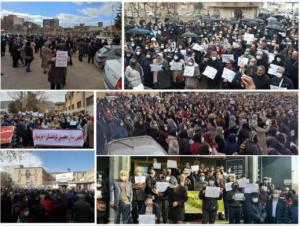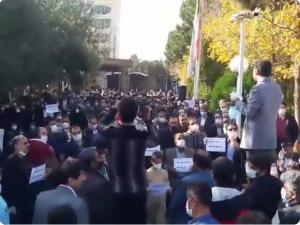(Video) Iran protests in 2021: Growing tensions hint at what is to come
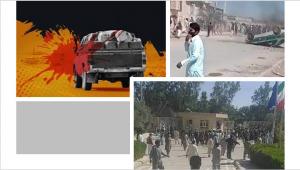
February 2021: The killing of fuel porters in the Sistan and Baluchestan provinces triggered intense protests that continued for weeks, despite severe repressive measures by the regime and a province-wide internet blackout.
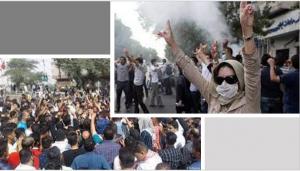
July 2021: The regime responds violently to protests over power outages in Khuzestan province. Security forces open fire and kill dozens of civilians who have come to the streets for their basic needs in the hot summer weather.
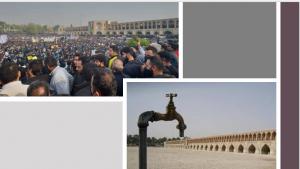
November 2021: Protests over water shortages and bad government policies take shape in Isfahan and continue for several weeks and gradually spread to the neighboring Charmahal and Bakhtiari province.
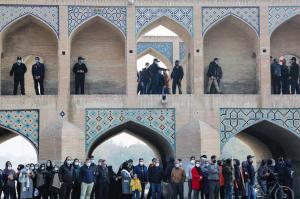
While the protests began by farmers, thousands of people from all walks of life join them. Eventually, the regime responds by dispatching security forces, and opening fire on the protesters to stop their growing movement.
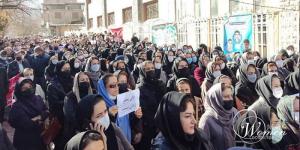
December 2021: Iranian teachers hold their biggest nationwide protest, holding demonstrations and strikes in more than 100 cities across Iran. After months of calling on the regime to pass laws that address their most basic needs.
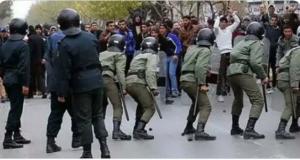
The strike, which lasted three days, created fear among regime officials, who tried to threaten them. In some cities, thousands of teachers joined the rally. The regime’s anti-riot forces failed to disperse the protesters.
Mullahs faced the resistance of protesters. In many cases protests that were triggered by economic woes turned into anti-regime demonstrations in all cities.
February 2021: The killing of fuel porters in the Sistan and Baluchestan Province triggered intense protests that continued for weeks, despite severe repressive measures by the regime and a province-wide internet blackout.
July 2021: The regime responded violently to protests over power outages in Khuzestan Province. Security forces opened fire and killed dozens of civilians who came to the streets for their basic needs in the hot summer weather. Despite the heavy repression, protests continued for two weeks and expanded to other provinces.
November 2021: Protests over water shortages and bad government policies took shape in Isfahan and continued for several weeks and gradually spread to the neighboring Charmahal and Bakhtiari Province.
While the protests began by farmers, thousands of people from all walks of life joined the demonstrations. Eventually, the regime responded by dispatching security forces, burning the protesters’ tents, and opening fire on the protesters to stop their growing movement. The people of Isfahan resisted the regime’s repressive forces and continued their protests for several more days.
December 2021: Iranian teachers held their biggest nationwide protest, staging demonstrations and strikes in more than 100 cities across Iran. After months of calling on the regime to pass laws that address their most basic needs, the teachers came back to the streets in response to a bill that glossed over their needs and only approved a fraction of the budget needed for their needs.
The strike, which lasted three days, terrified the regime officials, who tried to threaten the teachers. In some cities, thousands of teachers joined the rally. The regime’s anti-riot forces failed to disperse the protesters.
These are just a glimpse of what is happening in Iran. Every day, smaller protests by workers, retired government employees, defrauded creditors, and other segments of society are happening in dozens of cities.
In the past year, the regime has tried all sorts of tactics to control the restive society. From providing temporary and half-hearted solutions to associating protesters with foreign enemies to trying to turn protesters against each other to using security forces, violence, arrests, and incarceration, the regime has gone every extra mile to prevent the escalation of protests.
But in every case, it has been met with the protesters' resistance, and in many cases, protests that were triggered by economic woes turned into anti-regime demonstrations calling for the regime's overthrow.
The real solution to prevent further protests is to address the true needs of the people, namely to fix the economy, create jobs, improve national production, address infrastructural problems, and improve the quality of life. But as the regime has proven in the past decades, it neither has the will nor the ability to address these demands.
Fixing the economy, creating jobs and production will come at the cost of abandoning the regime’s expensive terrorist projects in the region, shutting down its ballistic and nuclear weapons projects, slashing its immense spending on the Revolutionary Guards, and stopping corrupt economic policies that only fill the pockets of regime officials and elites.
For a regime that has built its rule on crime and corruption, going down this path will only result in its own unraveling. This is why the ruling mullahs are only doubling down on crimes and violence instead of addressing the basic demands of the Iranian people.
In tandem with growing protests, the regime has ratcheted up its repressive measures, including the execution of political prisoner Heidar Ghorbani and dozens of other executions in the past month. At the same time, the regime is resorting to widespread arrests of activists and protesters and is increasing pressure on political prisoners.
But the regime’s repressive apparatus is fast losing its power as the Iranian people, fed up with decades of tyranny and corruption, know that the only way to reclaim their rights is to take matters into their hands and continue their protests.
Shahin Gobadi
NCRI
+33 6 51 65 32 31
email us here
Teachers hold protest rallies in more than 100 cities
Legal Disclaimer:
EIN Presswire provides this news content "as is" without warranty of any kind. We do not accept any responsibility or liability for the accuracy, content, images, videos, licenses, completeness, legality, or reliability of the information contained in this article. If you have any complaints or copyright issues related to this article, kindly contact the author above.

